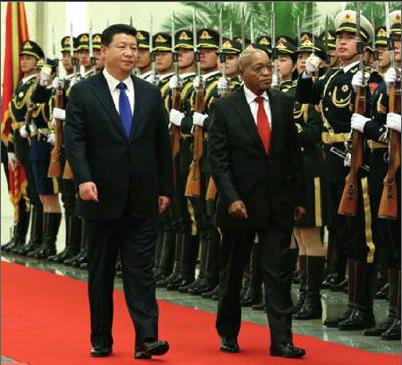A Multifaceted Friendship
2015-01-12

South African President Jacob Zuma paid a state visit to China on December 3-6, leading a delegation of government ministers and close to 100 business people from various sectors. With this being the second state visit to China by President Zuma since August 2010, it is clear that Sino-South African cooperation is on the rise. South Africas International Relations and Cooperation Minister Maite Nkoana-Mashabane said that the visit aimed to review and bolster the countrys relationship with China, focusing on “the priority issues of development in South Africa and Africa.”
In an interview conducted via e-mail ahead of the visit, Beijing Reviews Africa Managing Editor Francisco Little asked President Zuma about details regarding the focal points of strengthening bilateral relations and what measures are being taken to increase South Africas manufacturing exports to China. Excerpts of the interview follow:
Beijing Review: With China being South Africas biggest trading partner and South Africa being Chinas biggest trading partner in Africa, what are the central themes around the strengthening of investment relations between the two?
Jacob Zuma: The Beijing Declaration on the Establishment of a Comprehensive Strategic Partnership (2010) encapsulates all facets of our relationship with China. Within the context of this agreement we are committed to:
working toward a more equitable trade balance;
encouraging trade in manufactured valueadded products;
increased trade and investment missions;
establishing a joint working group on trade statistics;
encouraging Chinas enterprises to increase investment in South Africas manufacturing industry;
promoting value-adding activities in close proximity to the source of raw materials;
facilitating beneficiation at source;
providing mutual technical support in the areas of green economy, skills development and industrial financing; and
encouraging companies from both countries to explore cooperation opportunities in infrastructure construction projects in areas such as roads, railways, ports, power generation, airports and housing.
These broad themes remain consistent in all our engagements.
How can China support South Africas industrialization agenda?
China is fast growing its industry in South Africa, and increasingly leveraging our respective comparative advantages. Agreements are being finalized on the establishment of science and technology parks in South Africa. At this stage, the concept is revolving around linkages to innovation hubs, special economic zones and industrial development zones. Priority will be given to beneficiation of mineral resources for products to be exported to China, the automotive sector, information and communications technology (ICT), energy generation, and manufacturing. These talks have increasingly and very rapidly borne practical results.endprint
In 2014 alone, Chinese automobile manufacturer First Automobile Works has invested over 1 billion rand ($90.4 million) in building a vehicle assembly plant in Coega, in South Africas Eastern Cape Province. In 2013, technology producer Hisense opened a factory in Atlantis, north of Cape Town, employing 300 South Africans in the production of goods for export to the broader African market. Cement producer Jidong Development Group and the China-Africa Development Fund recently agreed to establish a 1.8-billion-rand ($162.7 million) cement plant in Limpopo, with a projected production rate of 1 million tons of cement at full production.
Could you comment on how Chinas investment in South African science and technology, agro-processing, mining and mineral beneficiation, renewable energy, finance, and tourism can impact South Africa going forward? The science and technology park initiative will be coordinated by the [South African] Department of Trade and Industry as part of industrialization and innovation programs. The development of these industrial parks and science and technology zones will focus on value addition, beneficiation, ICT and agro-processing.
Regarding financial collaboration, in September 2014, the first meeting of the ChinaSouth Africa Inter-Ministerial Joint Working Group on Cooperation was held in Beijing. During the meeting, it was agreed that financial cooperation will play a key role in advancing cooperation and both sides will make joint efforts to continue discussing and reinforcing financial cooperation means, for the purpose of advancing important projects between the two countries. These discussions remain ongoing among our financial sector stakeholders and we look forward to them presenting the outcomes thereof.
On tourism, we believe that we have enormous potential in developing our respective markets. China is South Africas fourth largest source market for tourist arrivals for the second year in a row, with tourist arrivals from China growing by 14.7 percent to reach 151,847 in 2013, and this is only the very early stage of the envisaged growth that we expect from the Chinese market.
Commercial memorandums of understanding (MOUs) focusing on media, banking, and technology are to be signed during your visit to China at the China-South Africa Business Forum on December 5. What kinds of partnerships are envisaged in the field of media?endprint
All these agreements are directly linked to the overall context and objectives of our relations, as indicated earlier. These agreements in many respects reflect the specific areas of cooperation, in the various critical sectors of our economy. I believe that the MOU between South Africas Independent Media and the China International Television Corp. will clearly outline efforts they plan to take in order to deepen cooperation and expand the business and commercial interests that they share in the media sector. I also hope that it will assist in the process of bringing our people closer together through news and awareness of our respective countries.
South African Minister of Trade and Industry Rob Davies has said that the composition of trade between the two countries remains a concern for South Africa and there are measures underway to increase South Africas exports of manufactured products to China. What are some of these measures?
Both countries, on a bilateral level, are looking very closely at this, and we have agreed that we must work toward a more sustainable trade balance. China has been very supportive and willing to work with us to achieve this end. One area we will explore more closely during the visit is to ensure inward buying missions from China to South Africa. We have identified a Top 10 list of products that have been prioritized for export from South Africa to meet Chinese consumer needs. These include agro-processed goods(wines, cereals, fruit, fish, and bovine meat), chemicals, plastics, steel, aluminum, automotive parts, mining safety equipment, industrial pumps, electro-technical goods, paper and pulp. In addition we will be working more closely on beneficiation and value-added products.
Next year is the Year of China in South Africa. What events have been planned in South Africa to celebrate this great occasion?
All stakeholders are currently engaged on this matter and we will all be advised of a comprehensive program.endprint
